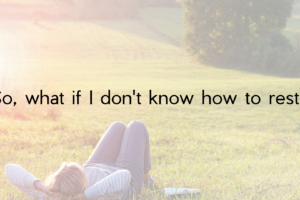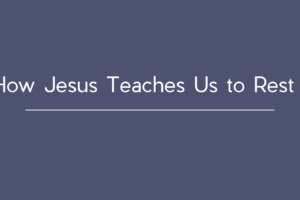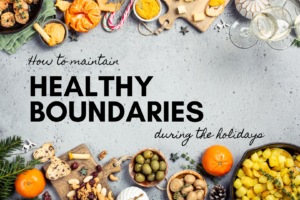We have come to the one year mark of COVID’s infiltration into our proximity. Both collectively and personally, we have all had our fair share of reflection on the year as a whole. Maybe you have asked questions like “Why has this happened?” or “Will things ever go back to normal?” or “How will we make up for all that has been lost?” Such thoughts can surely bring you into a spiraling cycle of negativity, fear, and sorrow. However, I would like to ask a more positive question for reflection: What have you learned through this worldwide hardship?
As I slow down to reflect on all that God has taught me over the last year I am overwhelmed with bits of wisdom He has been gracious to share with me. To enumerate all that I have gleaned from this year of life would be too lengthy to share in this format, but here are just a few.
Safety is not defined as “not getting sick.”
Safety is much deeper than physical. What I mean by this is that the concept of safety is not all or nothing. It is not absolute, it is not a simple distinction of safety or danger in the physical self. Reflect with me: how does one measure a concept such as safety? Which definitions of “safety” are we trying to use in our current circumstances and in our individual self.
If you look up the definition in any of your commonly trusted dictionaries, you will find very concrete explanations of “being free from risk, danger, or harm”. This stirs many questions in me as a counselor, particularly about the achievability of such a standard. In our fallen world, considering the weight of its fallacies, are we able to truly live in a state of being without risk, danger, or harm?
Over the last year, we have heard so much about how to pursue physical safety by adhering to social distancing, wearing masks, being proactive in sterilization, and reducing contact. But at what cost has this pursuit of physical safety neglected other parts of our being? How have you pursued psychological safety throughout this pandemic? What have you considered to be vital in your emotional and mental safety? What about relational or spiritual safety?
Safety is for all parts of our being, not just our physical health. As a counselor, one thing I love working on with my clients is how to create a sense of safety in order to pursue healing and restoration.
Just as we have taken precautions out of our desire for physical safety, I have learned it is equally, if not more, important to consider what is necessary for psychological, mental, emotional, and spiritual safety. God has shown me how safety is much more relational than it is rigid. https://safetyrisk.net/a-philosophy-of-safety/
Adequate support is necessary for overall wellness.
I think it is fair to say that many have suffered greatly from loneliness and isolation in this era of “spread apart and stay at home”. While these were precautions taken to foster physical safety, we also know that humans are relational beings having been made in community.
This year has disrupted this concept a lot as restrictions have been put in place, reality moved to digital, and “normal” has been lost. Being separated from people, especially those we have deeper relationships with, deteriorates our overall wellness. I have learned that one of the biggest things that has kept me going through this year is my support system. The Lord has blessed me with the most wonderful friends, loving co-workers, supportive church, and even the kindness of strangers at times.
As we seek to pursue wellness as people, this is only achieved when we have adequate support from others. When we are able to develop and utilize supportive relationships we find that it is much easier to change and that said changes are more secure.
It has become increasingly difficult for many to build relationships, find support, and grow deeper in connection. COVID-19 has shone a light on many barriers we might have that keep us from living with the full support of those around us. I have been challenged to find what things I can control and how I can be proactive in maintaining relationships that provide support.
Resiliency is in us all.
One final idea that has been apparent across the globe since we have encountered COVID-19 and our reactions to it: we as humans are resilient beings. Each of us have been stretched to adapt our established rhythms in ways that have never been demanded of us.
We are still in the thick of this pandemic, yet we are still here, still fighting. Whatever your fight might look like, whether you are on the frontlines of medical care, adapting the way you teach students, finding ways to keep your business afloat, or empowering your weary and discouraged congregation of Christians, you are able to find resiliency. You have endured a lot over the last year: trauma, loss, trials, anger, and isolation. What has helped you come this far? What do you need help with in order to strengthen resiliency?
One thing I love to empower my clients with is the objective perspective of their strengths, helping them see characteristics in themselves that allow them to persevere. I believe God has created us all with the ability to persevere as this theme is found numerous times in Scripture.
Just when I think that I am empty and at my end, the Lord reminds me of the might of His strength. What ways has the Lord empowered and encouraged you? How are you recognizing your resiliency and learning to be adaptable?
Counseling is an empowering tool that many have found helpful in building resiliency in order to pursue wellness. Just like the other things I have mentioned, resiliency is holistic as it encompasses all parts of your being.






Recent Comments